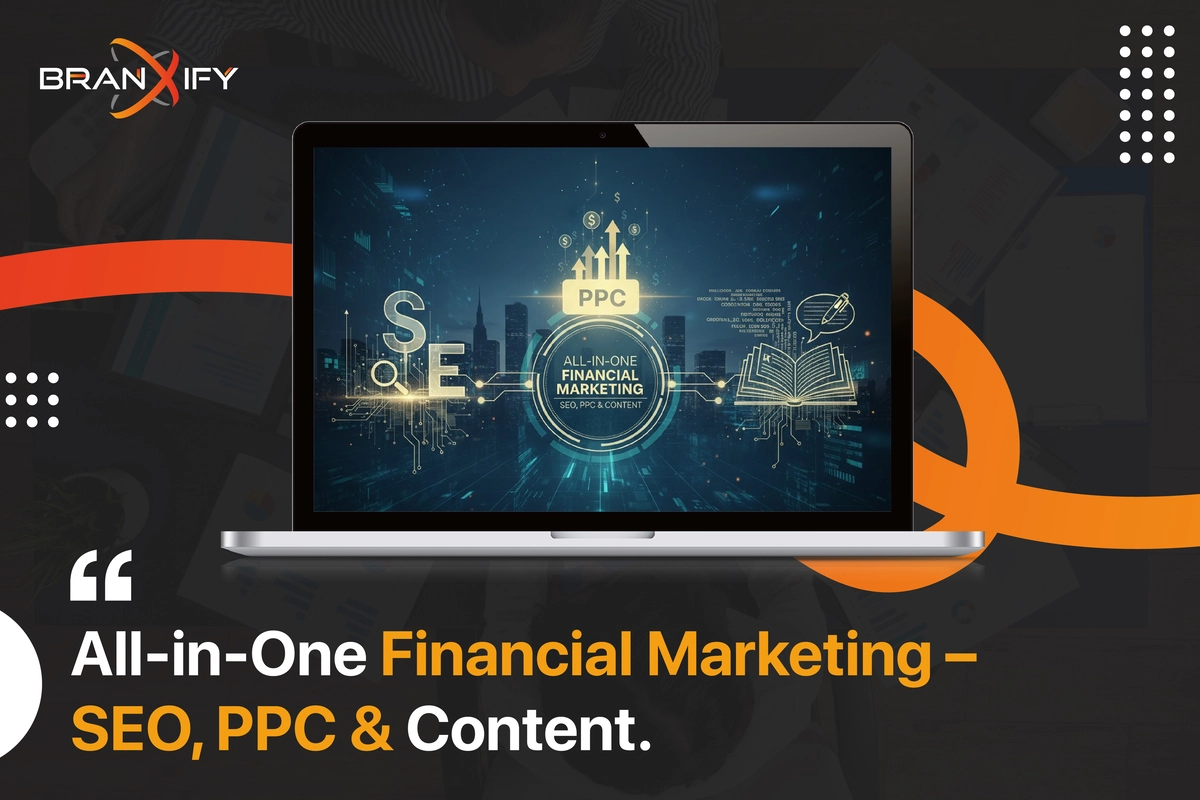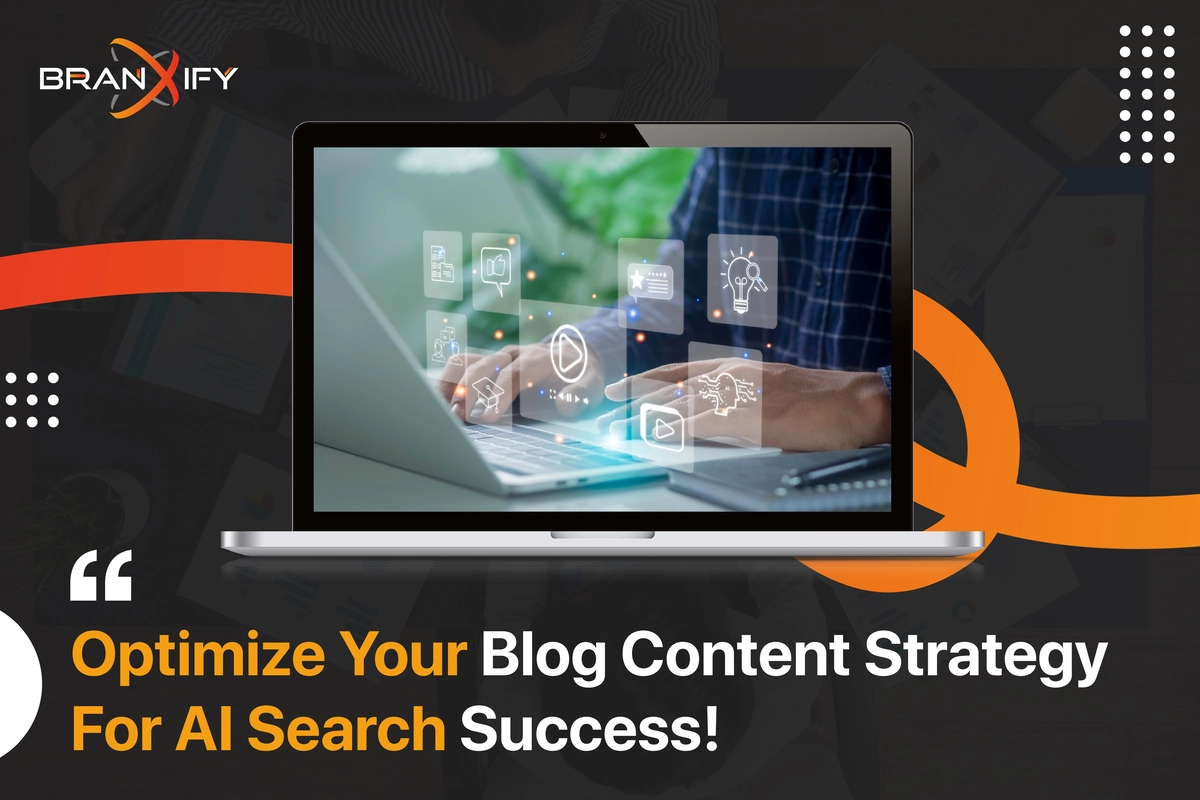A strong and effective SEO strategy in this challenging landscape of B2B marketing is essential for lead generation, driving much growth to business, and improving brand visibility among specific audiences. A well-executed B2B SEO agency’s campaign not only boosts the search engine rankings of your website but also perfectly aligns with objectives that assist in growing your business, provide measurable outcomes, and target a specific audience. Branxify, excels in designing and implementing customized B2B SEO campaigns that allow businesses to enhance their online visibility, attract high-quality leads, and drive long-term growth. In this article will define how to create a winning B2B SEO campaign.
What is meant by B2B SEO?
B2B SEO is optimizing a website and its content to rank higher on search engines such as Google for keywords relevant to business buyers and other companies. A B2B SEO agency aims to increase the visibility of a business’s website in search engine results pages (SERPs), draw qualified traffic, and generate leads or conversions that can turn into partnerships, sales, or long-term business relationships.
Key Features of B2B SEO:
Target Audience:
The audience comprises business decision-makers, managers, or procurement specialists rather than individual consumers. These buyers usually conduct more research before making purchasing decisions, and their buying process is often longer and more complex.
Search Intent:
In B2B SEO, users typically have a commercial or transactional search intent. They may search for products, services, case studies, reviews, or solutions to solve typical business challenges. Keywords are usually more niche, industry-specific, and focused on business solutions compared to the wider terms that might be employed in B2C SEO.
Long Sales Cycles:
B2B sales cycles often take longer and involve numerous stakeholders. B2B SEO strategy focuses on educating, nurturing, and building trust with leads over time. This means creating high-quality content that addresses pain points, shows expertise, and offers solutions.
Lead Generation Focus:
B2B SEO agency strategies are designed to develop qualified leads rather than just traffic. These leads could be individuals who can become clients, partners, or customers. The goal of B2B SEO agency is to draw businesses that are probable to engage in longer-term relationships.
Content Depth:
B2B content is more in-depth and authoritative than B2C content, as decision-makers are usually looking for straightforward information that addresses their specific business requirements. This might involve case studies, whitepapers, industry reports, or technical specifications.
Niche Keywords:
Unlike B2C SEO, which may target broader terms (e.g., “buy smartphones” or “best shoes”), B2B SEO usually focuses on particular, long-tail keywords (e.g., “enterprise cybersecurity solutions for finance” or “The best B2B SEO agency for boost my website”).
Multi-Channel Strategy:
B2B SEO agency usually works alongside other marketing efforts like content marketing, email marketing, social media, and PPC (Pay-Per-Click). The B2B SEO agency’s objective is to engage the audience across numerous touch points and guide them through the decision-making process.
Did you know? Apple stands out as a prime example of a company successfully operating in both B2B and B2C markets.
Key Components of a B2B SEO Strategy:
- Keyword Research: Specify the terms and phrases that your target business audience is utilizing to search for products or services similar to yours. This can involve industry-specific jargon, pain points, and long-tail keywords.
- On-Page SEO: Optimize website elements, like meta tags, headings, content, images, and URLs, to assure that pages are optimized for both search engines and users.
- Content Strategy: Create useful, informative content that perfectly aligns with the requirements of your target audience. This can contain blog posts, case studies, webinars, whitepapers, and industry reports.
- Link Building: Acquire high-quality backlinks from reputable industry sources to enhance domain authority and reliability in the eyes of search engines.
- Local SEO: If your business targets any specific geographic area, optimizing your website for local search is crucial. This may involve claiming and optimizing your Google My Business profile, local backlinks, and local content.
- Technical SEO: Assure that your site’s structure, speed, mobile-friendliness, and technical elements such as schema markup are optimized for search engines and users.
- Analytics and Reporting: Monitor the performance of your SEO campaign to comprehend which keywords, pages, or techniques are generating the best results. Employ this data to refine and enhance your continuous efforts.
Why B2B SEO Matters:
SEO or B2B SEO agency is essential for assuring your business ranks for the proper keywords and reaches the decision-makers who matter in the world of B2B marketing, where purchasing decisions usually involve numerous stakeholders and long decision-making cycles. Our B2B SEO agency, Branxify, knows that B2B buyers are highly research-driven, generally searching for detailed information to solve intricate business problems. That’s why our B2B SEO agency’s SEO approach is tailored to meet the specific requirements of B2B audiences—focusing not just on driving traffic, but on drawing qualified leads that convert into long-term clients.
Why is B2B SEO Important?
Visibility:
B2B buyers, in today’s modern and digital world, typically begin their research online. Without an SEO or B2B SEO agency, your business may be hidden from those actively searching for your products or services.
Cost-Effective Lead Generation:
B2B SEO provides a more sustainable, cost-effective way to draw qualified leads compared to traditional methods such as cold calling or attending trade shows.
Building Authority and Trust:
High-quality content, integrated with a trustworthy SEO strategy, assists in building your brand’s authority in the industry. Trust is crucial for B2B sales, and showing up on top of search results signals buyers that you are a reasonable and trustworthy partner.
Long-Term ROI:
While demanding time and effort, B2B SEO can result in long-term benefits. Once your site begins ranking well, its organic traffic can continue to drive leads and sales without the ongoing cost of paid advertising.
Why to Choose Branxify?
- Specialized B2B Expertise: Our B2B SEO agency understands the unique challenges of B2B marketing and tailors approaches to target decision-makers and influencers in your industry.
- Customized SEO Strategies: Every business is unique, and Branxify, our B2B SEO agency’s team, develops tailored SEO solutions that perfectly align with your specific objectives, industry, and target audience.
- In-Depth Keyword Research: Branxify, our B2B SEO agency, focuses on intent-driven keywords to draw high-quality leads and perform competitive analysis to outsmart competitors.
- Data-Driven Approach: Our B2B SEO agency continuously tracks performance with analytics, measures ROI, and optimizes campaigns for long-term success.
- Comprehensive SEO Services:
- On-Page SEO: Technical optimization, content strategy, and enhancing user experience.
- Off-page SEO: Making authoritative backlinks and increasing brand credibility.
- Content Strategy: Engaging and SEO-optimized content to draw traffic and conversions.
- Proven Success: A track record of Branxify, our B2B SEO agency, thriving campaigns promoting organic traffic and generating qualified clients leads.
Benefits of choosing our B2B SEO agency:
| Factor | Branxify | Other B2B SEO Agency |
| B2B Expertise | Deep understanding of B2B marketing, targeting decision-makers and influencers. | General SEO expertise tailored to something other than B2B requirements. |
| Data-Driven Decisions | Ongoing tracking, transparent analytics, and constant optimization. | Limited use of data or generic reporting. |
| Comprehensive SEO Services | Include on-page and off-page SEO, content strategy, and technical optimization. | May only focus on one aspect of SEO. |
| Clear Communication | Regular updates, transparent reporting, and a dedicated account manager. | Limited communication and reporting need to be clarified. |
| Scalable Solutions | SEO strategies that grow with your business, regardless of size. | One-size-fits-all services without flexibility. |
How to Create a Winning B2B SEO campaign?
Understand the Audience and Business:
It’s crucial for you to understand the demand of your Business and what your specific audience needs or wants before landing on the SEO technical aspect:
- Business Objectives: First, recognize your business’s objectives or goals with your effective SEO campaign. Your objectives can include generating great leads, improving the authority of your business’s brand, or increasing traffic to your website.
- Audience: Every business must know its specific audience before searching for effective keywords. Create personas of your specific buyer to capture who your audience is, their search behaviours, and their pain points. These personas should include the age, industry, job title, company size, challenges they faced, and keywords they used.
Keyword Research:
For every successful SEO campaign, there is a challenging search behind effective Keywords. These researches assist you in identifying the phrases and terms your specific audience uses to find services or products similar to yours.
- Primary and Secondary Keywords: To find relevant primary keywords and secondary keywords, use efficient tools like SEMrush, Ahrefs, or Google Keyword Planner
- Primary Keywords: Comprehensive terms linked to your industry, products, or services, for example, “B2B SEO agency market”.
- Secondary Keywords: Long-tail phrases or keywords that are more detailed and slightly competitive, for example, “best B2B SEO agencies strategies”.
Analyze Competitors:
Analyzing your rivals is a key step in refining your SEO strategy. By examining the keywords your competitors are targeting, you can uncover potential opportunities and gaps. Tools like Ahrefs or SEMrush can provide valuable insights into competitor keyword strategies, helping you identify areas where you might be able to outperform them or discover untapped opportunities.
In addition to competitor analysis, it’s crucial to use search intent when selecting and optimizing keywords. Understanding the underlying intent behind user searches ensures your content meets their needs and aligns with what they are looking for.
There are different types of search intent to consider:
- Informative Intent: This type of intent is typically seen in users who are seeking specific information. For example, someone searching for “how to improve B2B SEO” is looking for tips or strategies to improve their SEO knowledge. Content that answers questions or provides insights is best suited for this intent.
- Transaction Intent: These users are ready to take action, whether that’s making a purchase, signing up for a service, or engaging in another form of conversion. An example of this is a search query like “buy B2B marketing software.” Content designed to appeal to transactional intent should include clear calls to action and highlight product or service offerings.
By tailoring your SEO strategy to target both informative and transactional intent, you can better align your content with the needs of users, ultimately improving your rankings and conversion rates.
Website Optimization:
Optimize of website includes several aspects that contribute to user experience and effective search engine rankings.
On-Page SEO:
On-Page SEO involves optimizing various elements of a webpage to improve its search engine ranking and user experience. Key strategies include creating compelling titles, tags, and Meta descriptions that include primary keywords to attract clicks. Additionally, using H1, H2, and H3 tags effectively helps structure content and naturally incorporates target keywords. Crafting informative, relevant, and high-quality content is crucial to meeting the needs of your specific audience while ensuring it includes the necessary keywords. Lastly, internal linking is important for guiding visitors to relevant pages within your site, enhancing both navigation and overall site structure.
Technical SEO:
Technical SEO focuses on optimizing the backend aspects of your website to improve its performance, crawlability, and overall user experience. One key element is site speed, where tools like PageSpeed Insights help identify and fix issues to ensure fast loading times, which is crucial for retaining users. Additionally, mobile-friendliness is essential, requiring optimization of your site for a smooth experience across all mobile devices. Another important aspect is the XML sitemap, which should be developed and submitted to search engines to help them crawl and index your site more effectively. Lastly, the robots.txt file is used to manage which pages search engines are allowed to access, giving you control over site crawling and indexing.
User Experience (UX):
User Experience (UX) is all about creating a seamless and engaging experience for visitors to your website. Navigation plays a key role, ensuring that your site is easy to explore with a clear, well-organized menu structure and an intuitive flow. This helps users find what they’re looking for quickly and effortlessly. In addition, incorporating effective Call-to-Actions (CTAs) is crucial. These should be compelling and strategically placed to guide visitors toward desired actions, such as filling out a contact form or requesting a demo, ultimately driving conversions and engagement.
Content Strategy:
Creating effective and captivating content is a crucial SEO component. A well-informed content strategy assists to engage and attract your specific audience.
- Effective Content: Focus on developing compelling content that addresses the challenges of your audience and provides valuable insights. Customize your approach for specific industries, such as creating content for lawyer websites to address legal FAQs, highlight case studies, or explain complex legal concepts in simple terms.
- Blog Posts: Regularly publish engaging and practical blog posts on industry-related topics such as case studies and how-tos.
- EBooks: Presents in-depth guides and reports, generating leads and user registration.
- Videos: Take assistance from visual content to share challenging and complex details or information in an engaging format.
- Calendar: Create a content calendar to schedule and plan your effective content, ensure continuance publishing, and allow you to align your content with industry events, product launches, or key dates.
- Promotion: Promote your effective content through these mediums:
- Email Marketing: Circulate your content through email newsletters to generate more leads and keep your audience well-informed.
- Social Media: Share effective content on social media to increase engagement and enhance visibility.
- Guest Blogs: Publish guest posts for industry blogs so you can convey to a broader audience and help to build backlinks.
Quality Backlinks:
Inbound links, or Backlinks, are crucial for B2B SEO services as they signal to search engines that your business content is reliable and authoritative.
Link-Building Strategy:
A strong Link-Building Strategy is essential for improving your site’s authority and search engine rankings. One effective approach is outreach, where you reach out to industry influencers, bloggers, and other relevant websites to request backlinks to your content. Collaboration is another powerful tactic, where partnering with industry experts or relevant organizations on joint projects can help generate valuable backlinks to your site. Additionally, listings in reputable industry directories and websites can boost your site’s visibility and backlink profile. Finally, it’s important to analyze backlinks using tools like Ahrefs or Moz to track your backlink quality. Regularly monitor your backlink profile to ensure that you are gaining high-quality links and disavow any spammy or toxic links that could negatively impact your SEO efforts.
Local SEO:
Local SEO can improve business visibility for B2B companies with a local presence or for those targeting geographic regions.
- Google My Business Optimization: Optimize and claim your Google My Business listing to emerge in local search results and Google Maps. Your listing must include authentic information about your business, such as your phone number, address, or working hours.
- Local Keywords: Include local keywords in your Meta tags, content, and business listings to target specific region searches.
- Local Citations: Build citations in industry-related websites and local directories through business listings to enhance the visibility of local searches.
International SEO:
International SEO services are the website optimization process to rank in search engines across various nations and languages.
- Enhanced Visibility: Help your website emerge in search results in multiple nations, increasing its global visibility and reach.
- Traffic: By optimizing for various languages and regions, you attract relevant traffic that is more likely to convert, leading to higher sales and engagement.
- User Experience: Optimized site structures and localized content enhance the user experience for international visitors, making your website relevant and user-friendly.
Analyze Performance:
Analyzing the performance of your SEO campaign is essential for understanding what’s working well and identifying areas for improvement. This helps you refine your strategy, optimize resources, and drive better results. Two critical tools for this analysis are Google Analytics and Google Search Console.
Google Analytics:
This tool provides valuable insights into user behavior, conversion metrics, and website traffic. By using Google Analytics, you can track how users are interacting with your site, which pages are driving the most traffic, and where visitors are coming from. It allows you to assess the performance of different content and identify opportunities for improvement, such as optimizing underperforming pages or enhancing user engagement.
Google Search Console:
This tool is specifically designed for monitoring your site’s performance in Google search results. It helps you track keyword rankings, monitor search performance, and spot issues that could be affecting your site’s visibility. Google Search Console also provides insights into click-through rates (CTR), indexing issues, and any manual penalties that could impact your SEO efforts.
Key Metrics:
Key metrics are essential for evaluating the effectiveness of your SEO efforts. Organic traffic measures the number of visitors coming from search engines, indicating how well your site is performing in search results. Keyword rankings track the position of your target keywords over time, helping you understand your visibility. Conversion rates are crucial for assessing how well your site turns visitors into customers or leads. The bounce rate shows the percentage of visitors who leave after viewing only one page, highlighting potential issues with user engagement. Lastly, it’s vital to adapt your strategy by making data-driven adjustments based on performance, such as refining keyword targeting, improving link-building efforts, and optimizing underperforming content.
SEO Trends:
The field of SEO never stops evolving, but it grows day by day, as do B2B SEO agency trends. Being well-informed about the latest updates and trends is key to keeping your SEO strategy effective.
- Industry-Related News: Follow SEO blogs, forums, and newsletters to stay up-to-date on industry news, algorithm changes, and best practices.
- Continuous Learning: Your continuous learning, training, and education will keep you updated with SEO enhancements and advancements.
Did you know? B2B offers distinct advantages over B2C with its higher-value transactions, longer-term relationships, and more stable revenue streams.
Conclusion:
For any SEO specialist, creating a winning B2B SEO campaign requires a wider strategy that includes an understanding of your business goals and audience intents. By optimizing your website, conducting wider keyword research, using international SEO services, leveraging local SEO, building backlinks, and developing a robust content strategy, you can develop an effective B2B SEO campaign through our B2B SEO agency.






